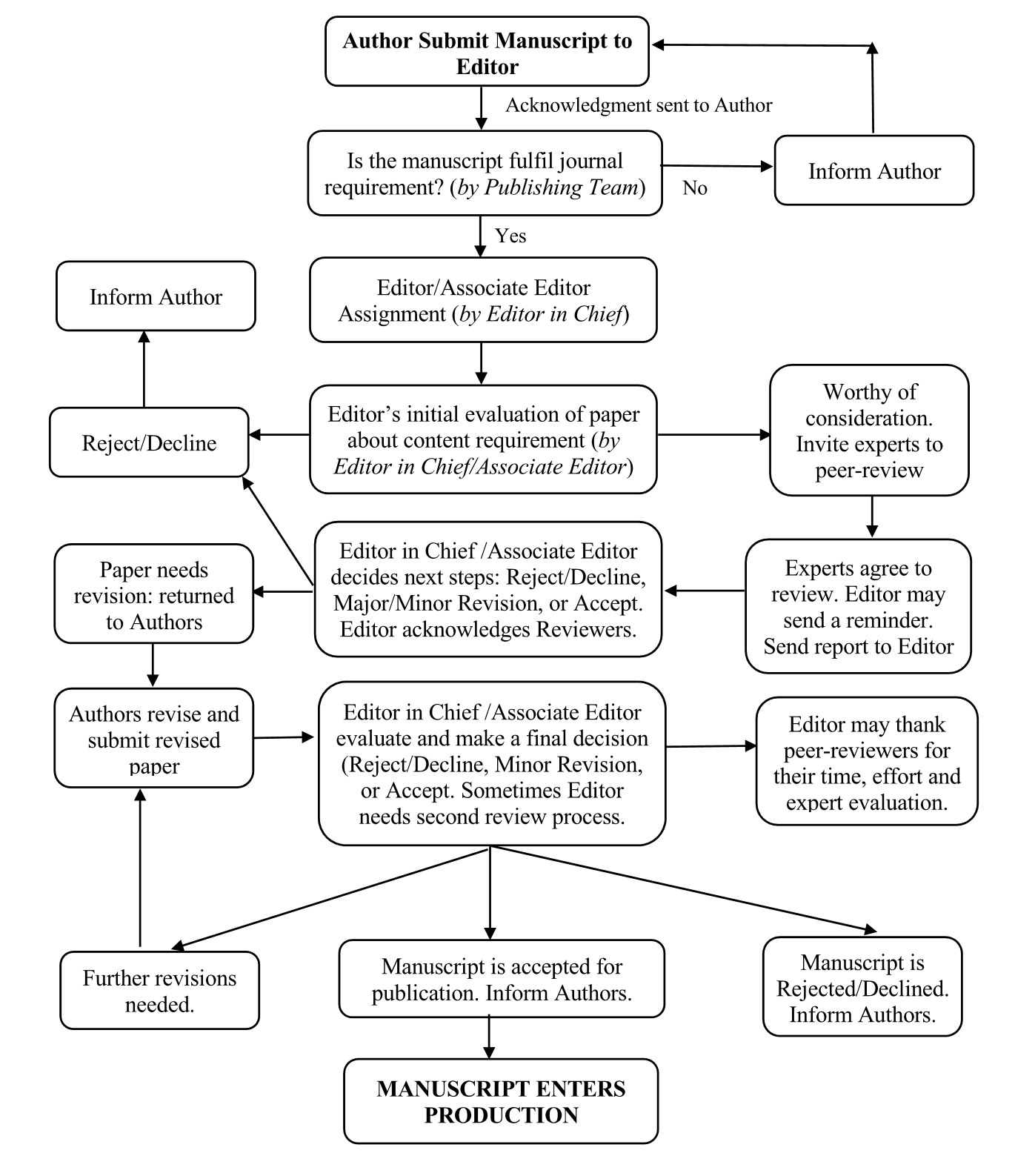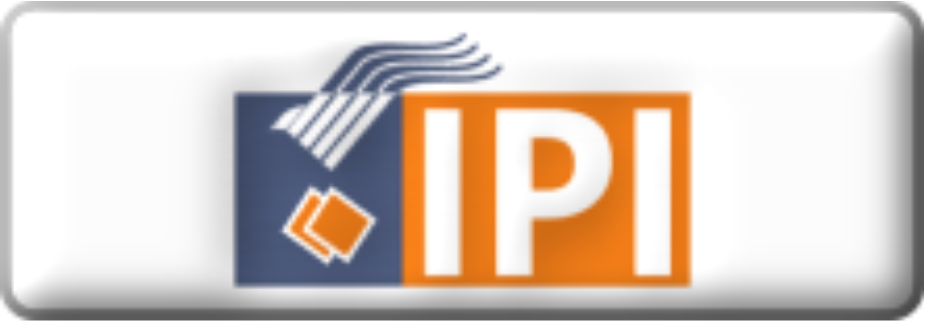- » Focus and Scope
- » Section Policies
- » Peer Review Process
- » Open Access Policy
- » Archiving
- » Publication Ethics
- » Online Submission
- » Screening for Plagiarism
- » Retraction
- » Indexing
Focus and Scope
The focuses of the manuscript received in the Gravity journal is limited to the topic:
- Physics Education (Media, Educational Policy, Assessment, Learning Model)
- Theoretical Physics
- Material Physics
- Earth and Environmental Physics
- Astrophysics
- Medical Physics
- Computational Physics and Instrumentation
Section Policies
Articles
Halaman Sampul
Education
Physics
Peer Review Process
Each article submitted to Gravity will be selected first by the editorial board. At this stage, the editorial board will judge based on the research topic and the suitability of the writing with the template. If it is declared "feasible," then the next process is sending the article to the reviewer. The review process is a double-blind peer review, meaning reviewers and authors do not know each other. The number of reviewers involved is two (2) reviewers per article. Reviewers judge based on the content, suitability of material with the journal, and the references used. The assessment using the form provided at OJS, or the reviewer can comment on the article. The review process takes two (2) weeks.
Recruitment of reviewers is conducted openly from inside and outside UNTIRTA. Recruitment considers the suitability of the field and expertise of reviewers, has a reputation, and has written articles in international journals.

Open Access Policy
This journal provides direct open access to its content with the principle that making research freely available to the public supports greater global knowledge exchange. Articles are freely available to customers and the wider community with permitted reuse.
Archiving
This journal utilizes the LOCKSS system to create a distributed archiving system among participating libraries and permits those libraries to create permanent archives of the journal for purposes of preservation and restoration. More...
Publication Ethics
Publication Ethics
Publication Ethics and Malpractice Statement
Gravity: Jurnal Ilmiah Penelitian dan Pembelajaran Fisika is a peer-reviewed e-journal. This statement clarifies ethical behavior of all parties involved in the act of publishing an article in this journal, including the author, the editor in chief, the editor, the peer-reviewer and the publisher (Department of Science Education Faculty of Teacher Training and Education Universitas Sultan Ageng Tirtayasa. This statement is based on COPE’s Best Practice Guidelines for Journal Editors.
Ethical Guideline for Journal Publication
The publication of an article in a peer-reviewed of Jurnal Ilmiah Penelitian dan Pembelajaran Fisika is an essential building block in the development of a coherent and respected network of knowledge. It is a direct reflection of the quality of the work of the authors and the institutions that support them. Peer-reviewed articles support and embody the scientific method. It is therefore important to agree upon standards of expected ethical behavior for all parties involved in the act of publishing: the author, the journal editor, the peer reviewer, the publisher and the society.
Department of Physics Education, Faculty of Teacher Training and Education, Universitas Sultan Ageng Tirtayasa, as the publisher of Gravity: Jurnal Ilmiah Penelitian dan Pembelajaran Fisika takes its duties of guardianship over all stages of publishing extremely seriously and we recognize our ethical and other responsibilities. We are committed to ensuring that advertising, reprint or other commercial revenue has no impact or influence on editorial decisions. In addition, the Department of Science Education Faculty of Teacher Training and Education Universitas Sultan Ageng Tirtayasa.
Publication decisions
The editor of the Gravity: Jurnal Ilmiah Penelitian dan Pembelajaran Fisika is responsible for deciding which of the articles submitted to the journal should be published. The validation of the work in question and its importance to researchers and readers must always drive such decisions. The editors may be guided by the policies of the journal's editorial board and constrained by such legal requirements as shall then be in force regarding libel, copyright infringement and plagiarism. The editors may confer with other editors or reviewers in making this decision.
Fair play
An editor at any time evaluate manuscripts for their intellectual content without regard to race, gender, sexual orientation, religious belief, ethnic origin, citizenship, or political philosophy of the authors.
Confidentiality
The editor and any editorial staff must not disclose any information about a submitted manuscript to anyone other than the corresponding author, reviewers, potential reviewers, other editorial advisers, and the publisher, as appropriate.
Disclosure and conflicts of interest
Unpublished materials disclosed in a submitted manuscript must not be used in an editor's own research without the express written consent of the author.
Duties of Reviewers
Contribution to Editorial Decisions
Peer review assists the editor in making editorial decisions and through the editorial communications with the author may also assist the author in improving the paper.
Promptness
Any selected referee who feels unqualified to review the research reported in a manuscript or knows that its prompt review will be impossible should notify the editor and excuse himself from the review process.
Confidentiality
Any manuscripts received for review must be treated as confidential documents. They must not be shown to or discussed with others except as authorized by the editor.
Standards of Objectivity
Reviews should be conducted objectively. Personal criticism of the author is inappropriate. Referees should express their views clearly with supporting arguments.
Acknowledgement of Sources
Reviewers should identify relevant published work that has not been cited by the authors. Any statement that an observation, derivation, or argument had been previously reported should be accompanied by the relevant citation. A reviewer should also call to the editor's attention any substantial similarity or overlap between the manuscript under consideration and any other published paper of which they have personal knowledge.
Disclosure and Conflict of Interest
Privileged information or ideas obtained through peer review must be kept confidential and not used for personal advantage. Reviewers should not consider manuscripts in which they have conflicts of interest resulting from competitive, collaborative, or other relationships or connections with any of the authors, companies, or institutions connected to the papers.
Duties of Authors
Reporting standards
Authors of reports of original research should present an accurate account of the work performed as well as an objective discussion of its significance. Underlying data should be represented accurately in the paper. A paper should contain sufficient detail and references to permit others to replicate the work. Fraudulent or knowingly inaccurate statements constitute unethical behaviour and are unacceptable.
Data Access and Retention
Authors are asked to provide the raw data in connection with a paper for editorial review, and should be prepared to provide public access to such data (consistent with the ALPSP-STM Statement on Data and Databases), if practicable, and should in any event be prepared to retain such data for a reasonable time after publication.
Originality and Plagiarism
The authors should ensure that they have written entirely original works, and if the authors have used the work and/or words of others that this has been appropriately cited or quoted.
Multiple, Redundant or Concurrent Publication
An author should not, in general, publish manuscripts describing essentially the same research in more than one journal or primary publication. Submitting the same manuscript to more than one journal concurrently constitutes unethical publishing behavior and is unacceptable.
Acknowledgement of Sources
Proper acknowledgment of the work of others must always be given. Authors should cite publications that have been influential in determining the nature of the reported work.
Authorship of the Paper
Authorship should be limited to those who have made a significant contribution to the conception, design, execution, or interpretation of the reported study. All those who have made significant contributions should be listed as co-authors. Where there are others who have participated in certain substantive aspects of the research project, they should be acknowledged or listed as contributors. The corresponding author should ensure that all appropriate co-authors and no inappropriate co-authors are included on the paper and that all co-authors have seen and approved the final version of the paper and have agreed to its submission for publication.
Hazards and Human or Animal Subjects
If the work involves chemicals, procedures or equipment that have any unusual hazards inherent in their use, the author must clearly identify these in the manuscript.
Disclosure and Conflicts of Interest
All authors should disclose in their manuscript any financial or another substantive conflict of interest that might be construed to influence the results or interpretation of their manuscript. All sources of financial support for the project should be disclosed.
Fundamental errors in published works
When an author discovers a significant error or inaccuracy in his/her own published work, it is the author’s obligation to promptly notify the journal editor or publisher and cooperate with the editor to retract or correct the paper
Online Submission
Already have a Username/Password for Gravity: Jurnal Ilmiah Penelitian dan Pembelajaran Fisika?
Need a Username/Password?
Registration and login are required to submit items online and to check the status of current submissions.
Screening for Plagiarism
Gravity: Jurnal Ilmiah Penelitian dan Pembelajaran Fisika has a policy of screening for plagiarism. The Gravity use of Anti-Plagiarism Software "Turnitin" to check the authenticity of the article with a maximum similarity score of 20%.

Retraction
The articles published in Gravity: Jurnal Ilmiah Penelitian dan Pembelajaran Fisika will be considered to retract in the publication if:
- They have clear evidence that the findings are unreliable, either as a result of misconduct (e.g. data fabrication) or honest error (e.g. miscalculation or experimental error)
- the findings have previously been published elsewhere without proper crossreferencing, permission or justification (i.e. cases of redundant publication)
- it constitutes plagiarism
- it reports unethical research
The mechanism of retraction follows the Retraction Guidelines of Committee on Publication Ethics (COPE) which can be accessed at https://publicationethics.org/files/retraction%20guidelines.pdf
Indexing
Gravity : Jurnal Ilmiah Penelitian dan Pembelajaran Fisika has been indexed by:


_Kecil1.jpg)












